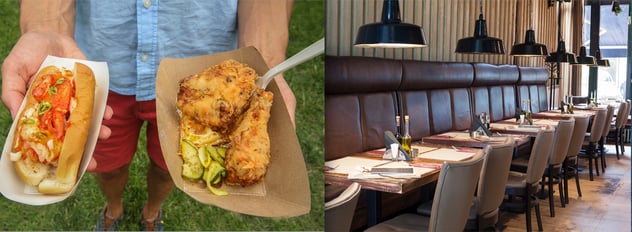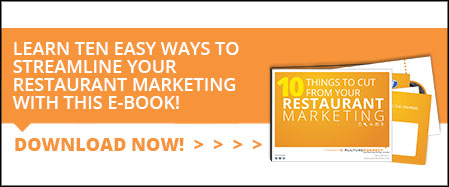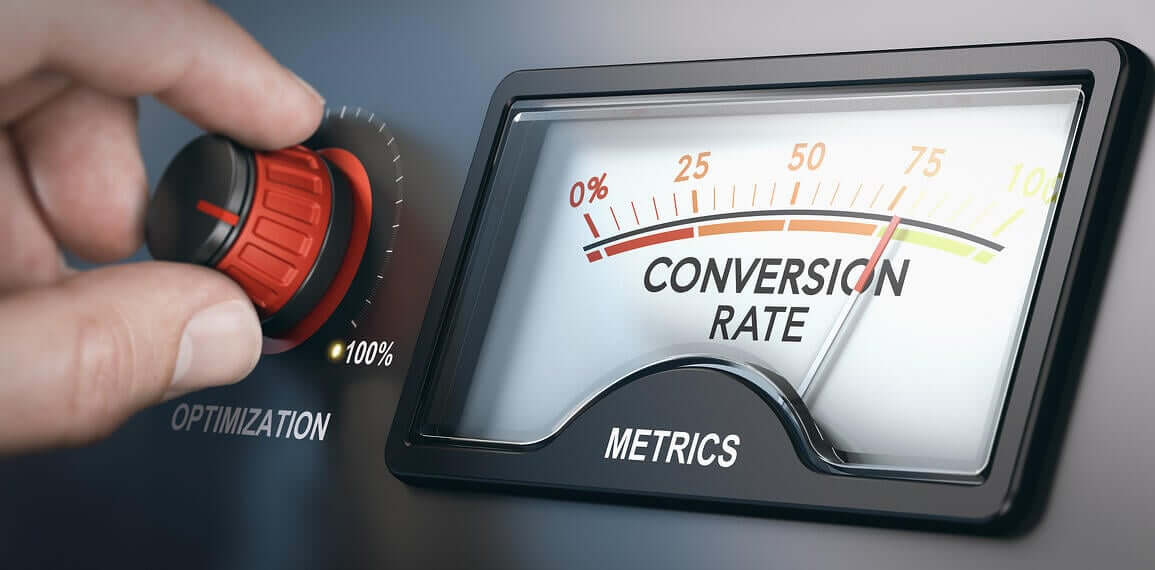
Are you considering jumping into the food truck business? Or are you still debating whether a restaurant would be more worth it? We found some interesting restaurant and food truck statistics as well as a breakdown that will help you decide which industry is best for you. If you haven't noticed, the food truck trend has taken off in the last several years with industry revenue increasing by an average of 12.4 percent from 2010 to 2015. In fact, food trucks brought in well over $1 billion in revenue in 2015. But don't get it twisted! Restaurants are still king in the food and beverage industry, bringing in over $709 billion dollars in the U.S. the same year. Both are very profitable, but what makes these two so different?
Below we break down the survival rate, restaurant and food truck start-up costs and laws you'll want to consider before giving it a go.
Survival Rate
Food Truck: The truth is both industries are risky. That is why having a detailed business plan of action is extremely crucial before diving in. It was found that 25 percent of food trucks fail within their first year and 60 percent fail within 3 years.
Restaurant: While 60 percent of restaurants fail within the first year, 80 percent don't quite make it to their fifth year. Yes, restaurants have an even higher failure rate. Why? Several reasons include:
-
Lack of funds (start-up capital)
-
Poor marketing execution: knowledge about competition, lack of promotion or unoriginal ideas
-
Bad location
-
Internal issues: poor management, inventory and being under staffed can translate into poor customer service.
-
Business partnerships gone sour
Expense Breakdown
Food Truck: Your financial plan is what will keep your food truck running. Making sure you have all of your bases covered should be the first part of your business plan! Starting a food truck can cost anywhere from $50,000 and up. As low as many might say the food truck business is, you still have to spend a good amount of money getting it up and running. Here is an expense breakdown:
Restaurant: The expense breakdown for a restaurant varies even more than food trucks. Opening a restaurant can range from $100,000 to $300,000. It'll depend on your restaurant's concept. Here are estimates of what you could possibly be looking at.
-
Rent or Leasing Costs - You'll have to pay a security deposit on top of rent. Security deposits will typically cost you one month of rent and on top of first month's rent estimated at $10,000 to $12,000.
-
Utilities - First month usage of internet, cable, phone service, electricity, gas, water and trash and including activation fees could run about $2,500.
-
Location improvement costs - This includes remodeling or customizing your restaurant, including the kitchen typically could run around $250,000 to $350,000.
-
Decor - Restaurant tables and furniture, depending on how many you will need, could run up your tab to $40,000.
-
Kitchen Wear - It is estimated to cost around $80,000 in total for tablewear, utensils, dishes, kitchen, and bar equipment.
-
Food and Beverage Supplies - You could spend an estimate of $8,000. Remember, if you are planning on including a bar with your restaurant concept this could be more.
-
Insurance - Inc.com estimates $6,000. However, it could be more considering what you need to be covered. Here's a list of insurance you might need to start up your restaurant: property, general liability (extremely important in case an employee or customer injures themselves at your location). Liquor liability for those planning on selling liquor. Workers compensation, unemployment insurance and specific peril insurance, which covers floods and natural disasters.
-
Permits and Licenses - Health permits, liquor and business license depending on your state, county or city could be around $5,000 to $20,000.
-
Payment/Ordering System (POS) - Unlike a food truck, restaurants sometimes need more than one POS system, depending on the size of your restaurant. The more capacity your restaurant holds the more customers you will be able to serve, the more POS systems your staff will need. This cost is estimated at $20,000.
-
Marketing and Advertising - To be specific, signage will typically cost you $15,000, menus $1,500, print work such as coupons, ad flyers $5,000 to $10,000 and your restaurant-opening event could run up to $15,000.
Keeping Up With the Laws
Food Truck: As a new owner you will need to familiarize yourself with federal and state laws. Researching the laws will allow you to fully understand them as it is a major part of keeping your business open and running. Food truck owners might not only serve one city, but possibly other locations. This is when it gets tricky. You will have to look into whether you will need another license and permits to operate in other counties or cities. You will need to research the laws thoroughly for the following:
-
Parking laws and permits
-
Business License
-
Sellers Permit
-
Resale Permit (If charging sales tax)
-
Food handling
-
Commissaries
-
Bathroom locations
-
Health Permit (Truck and food safety inspections)
Restaurant: Owners will also have to research laws and requirements for running and owning a restaurant. The list is very similar to what food trucks must obtain. There are only a few differences. The following is what you will need to start your restaurant:
-
Business License
-
Resale Permit (to charge and collect required sales tax from customers)
-
Health Permit
-
Food Handling
-
City and Fire Safety Inspections
-
Liquor License
-
Sign Permit
You can find this information at your local Department of Health, Department of Public Health and Department of Environmental Health.
Conclusion
I hope by now you have a pretty good idea of which industry you would rather enter. Opening a restaurant or bar is no longer the only option when it comes to the food and beverage industry. Food trucks have joined in and are here to stay. This only gives you more options to consider.
Starting up a restaurant might be more costly, but the food truck industry isn't necessarily for everyone. This is your chance to weigh your options and go over the pros and cons. Do as much research as possible! It's always recommended to review your business plan and financial plans with a professional.
If you have any questions regarding advertising, branding or marketing your food truck or restaurant contact us here. We are here to help!
<<Starting out in the food and beverage industry? Get a head start with our 10 Easy Ways to Streamline Your Restaurant Marketing with Kulture Konnect's e-book here>>










